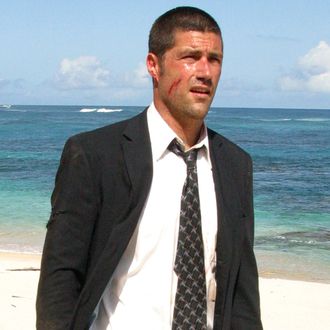
After recaps, think pieces, interviews, and quizzes, do you have more patience for talking about Lost on the internet? You should, because former Lost writer Javier Grillo-Marxuach has written an exhaustive account of his time on the show, describing the tensions and compromises inherent in every successful series. As Grillo-Marxuach tells it, Lost’s early development was marked by a struggle to include just enough mystical elements to keep the story interesting long-term, but never enough to turn off the suits at ABC. This was also why Jack didn’t die in the pilot as originally planned: “Murdering the one white male character with a discernible skillset that could serve to generate stories … would not go over well with the network.” Or, as Grillo-Marxuach remembers putting it, “You can’t kill the white guy.”
At the end of his “Lost Will and Testament,” Grillo-Marxuach gives what he hopes will be the answer that finally kills Lost’s un-killable question: Were they really making it up as they went along?
First we built a world. Then we filled it with an ensemble of flawed but interesting characters — people who were real to us, people with enough depth in their respective psyches to withstand years of careful dramatic analysis. Then we created a thrilling and undeniable set of circumstances in which these characters had to bond together and solve problems in interesting ways.
Soon thereafter, we created a way for you to witness their pasts and compare the people they once were with the people they were in the process of becoming. While that was going on, we also created an entire 747s worth of ideas, notions, fragments, complications, and concepts that would — if properly and thoughtfully mined — yield enough narrative fiction to last as long as our corporate overlords would demand to feed their need for profit and prestige, and then, just to be sure, teams of exceptionally talented people worked nonstop to make sure the 747 never emptied out.
And then we made it all up as we went.
Damon Lindelof couldn’t have put it better himself (mostly because he’s stopped talking about it).


